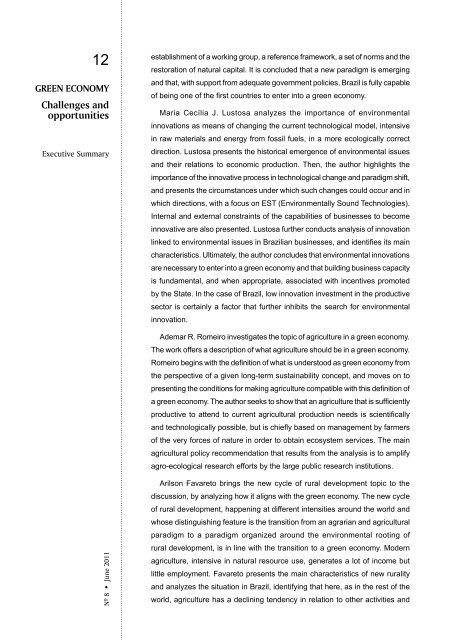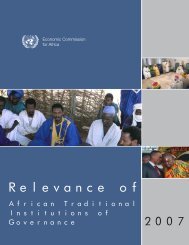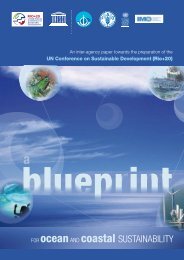Download Publication - Rio+20
Download Publication - Rio+20
Download Publication - Rio+20
Create successful ePaper yourself
Turn your PDF publications into a flip-book with our unique Google optimized e-Paper software.
12<br />
GREEN ECONOMY<br />
Challenges and<br />
opportunities<br />
Executive Summary<br />
establishment of a working group, a reference framework, a set of norms and the<br />
restoration of natural capital. It is concluded that a new paradigm is emerging<br />
and that, with support from adequate government policies, Brazil is fully capable<br />
of being one of the first countries to enter into a green economy.<br />
Maria Cecília J. Lustosa analyzes the importance of environmental<br />
innovations as means of changing the current technological model, intensive<br />
in raw materials and energy from fossil fuels, in a more ecologically correct<br />
direction. Lustosa presents the historical emergence of environmental issues<br />
and their relations to economic production. Then, the author highlights the<br />
importance of the innovative process in technological change and paradigm shift,<br />
and presents the circumstances under which such changes could occur and in<br />
which directions, with a focus on EST (Environmentally Sound Technologies).<br />
Internal and external constraints of the capabilities of businesses to become<br />
innovative are also presented. Lustosa further conducts analysis of innovation<br />
linked to environmental issues in Brazilian businesses, and identifies its main<br />
characteristics. Ultimately, the author concludes that environmental innovations<br />
are necessary to enter into a green economy and that building business capacity<br />
is fundamental, and when appropriate, associated with incentives promoted<br />
by the State. In the case of Brazil, low innovation investment in the productive<br />
sector is certainly a factor that further inhibits the search for environmental<br />
innovation.<br />
Ademar R. Romeiro investigates the topic of agriculture in a green economy.<br />
The work offers a description of what agriculture should be in a green economy.<br />
Romeiro begins with the definition of what is understood as green economy from<br />
the perspective of a given long-term sustainability concept, and moves on to<br />
presenting the conditions for making agriculture compatible with this definition of<br />
a green economy. The author seeks to show that an agriculture that is sufficiently<br />
productive to attend to current agricultural production needs is scientifically<br />
and technologically possible, but is chiefly based on management by farmers<br />
of the very forces of nature in order to obtain ecosystem services. The main<br />
agricultural policy recommendation that results from the analysis is to amplify<br />
agro-ecological research efforts by the large public research institutions.<br />
Nº 8 • June 2011<br />
Arilson Favareto brings the new cycle of rural development topic to the<br />
discussion, by analyzing how it aligns with the green economy. The new cycle<br />
of rural development, happening at different intensities around the world and<br />
whose distinguishing feature is the transition from an agrarian and agricultural<br />
paradigm to a paradigm organized around the environmental rooting of<br />
rural development, is in line with the transition to a green economy. Modern<br />
agriculture, intensive in natural resource use, generates a lot of income but<br />
little employment. Favareto presents the main characteristics of new rurality<br />
and analyzes the situation in Brazil, identifying that here, as in the rest of the<br />
world, agriculture has a declining tendency in relation to other activities and

















